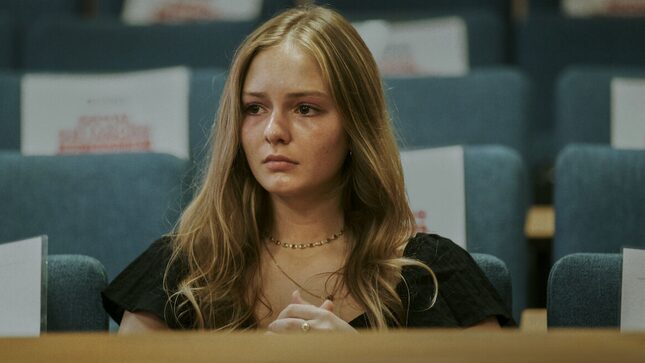Teen Accuses Hospital of ‘Medical Kidnapping’ After Her Mom Died By Suicide
Maya Kowalski's mother was falsely accused of Munchausen syndrome by proxy, wherein an attention-seeking caregiver imagines symptoms or makes them worse.
JusticePolitics

Last year, the story of Maya Kowalski—a young girl whose suffering from a series of strange symptoms including severe pain that spanned her body culminated in a hospital falsely accusing her mother of Munchausen syndrome by proxy (MSP)—shocked the internet. Kowalski’s mother, accused of attention-seeking and child abuse because medical personnel at John’s Hopkins Children’s Hospital speculated whether her daughter’s symptoms were real or had occurred naturally, died by suicide. Now, the 17-year-old is speaking out, as her family’s gut-wrenching struggles will be aired in a new Netflix documentary, Take Care of Maya, premiering at the Tribeca Film Festival this month and streaming on June 19.
In a People cover story, Kowalski and her father, Jack, start from the beginning, detailing how, at just 9 years old, the girl was struck by innumerable ailments—from asthma attacks to headaches to lesions on her extremities—that left doctors with more questions than answers. One physician went so far as to suggest she was imagining them. “But Maya would be crying 24/7,” Jack told the magazine. “We knew she wasn’t faking.”
Eventually, Kowalski’s mother, Beata, learned of complex regional pain syndrome (CRPS), a rare neurological condition that inflicts constant or intermittent pain in its host’s arms and legs. Severe sensitivity to touch is also a symptom of the condition, meaning those affected are prone to routine, excruciating discomfort. Dr. Anthony Kirkpatrick, a Tampa-based anesthesiologist and pharmacologist in Tampa who specializes in CRPS, officially diagnosed Maya with the condition in 2015.
For a while, the family found relief in Kirkpatrick, who treated the condition with infusions of ketamine, including five-day “ketamine comas” in which the nervous system is administered with a high dose of the drug to “reset” itself.
“I felt amazing,” Kowalski recalled of the treatments to People. The respite, however, was short-lived. The following year, Kowalski was hospitalized at John’s Hopkins for debilitating stomach pain. Beata—a registered nurse—reportedly begged nurses to administer a dose of ketamine to alleviate her daughter’s pain. The request concerned hospital staff enough to contact Florida’s version of Child Protective Services. The agency then launched an investigation of Beata and accused her of the mental disorder, in which a caretaker of a child either fabricates false symptoms or causes real symptoms in an effort to prove the child is ill. Kowalski was then separated from her parents and remained hospitalized in state custody for three months.
“One day I was in the ICU, and my mom kissed me on the forehead and was like, ‘I love you. I’ll see you tomorrow.’ I never saw her again,” Kowalski said. “I was medically kidnapped. I tried being hopeful, but there was a point where I thought, ‘I’m never getting out of this place.’”
A court-ordered psychological evaluation later determined that Beata did not have MSP, but she began “deteriorating” while away from her daughter. “She would stay up and research and hardly eat,” Jack recalled to the magazine. In a hearing, a judge even denied her the chance to give her daughter a hug, leaving her inconsolable.
After 87 days apart, Beata ended her life at age 43. “I’m sorry,” she wrote in an email found following her passing. “But I no longer can take the pain being away from Maya and being treated like a criminal. I cannot watch my daughter suffer in pain and keep getting worse.”
The Kowalski family has since filed a lawsuit against the hospital, with proceedings scheduled for September.